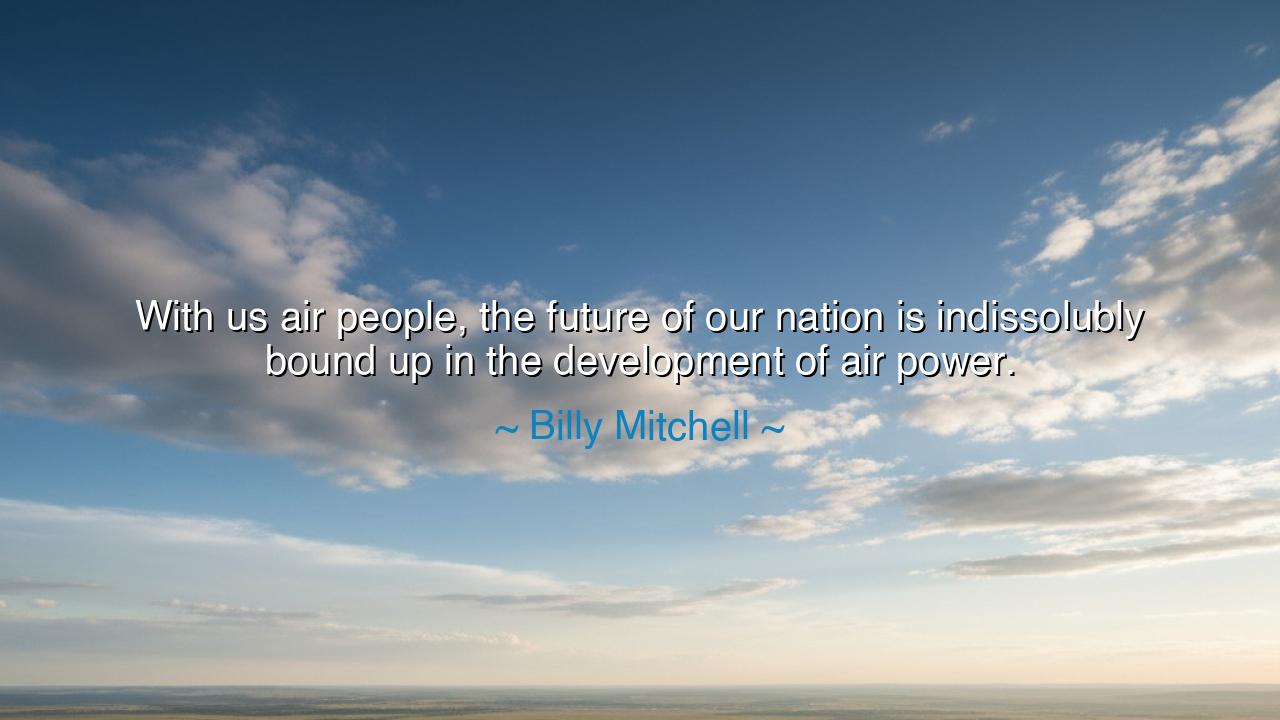
With us air people, the future of our nation is indissolubly
With us air people, the future of our nation is indissolubly bound up in the development of air power.






In the windswept skies, where the heavens meet the earth, there arises a new force—a force unlike any seen before in the history of humanity. It is a force that can shape the future, bend the course of destiny, and dictate the fate of nations. Billy Mitchell, a man whose vision transcended the limits of his time, spoke with the wisdom of one who understood that air power was not merely an instrument of war, but a harbinger of a new age—an age where the future of a nation would rise and fall with the mastery of the skies.
When Mitchell declared that the future of our nation was bound to the development of air power, he was not simply speaking of the advancement of military strength. He was heralding the dawn of a new era—an era where the sky was no longer a domain to be feared but a realm to be controlled. Just as the great empires of the past once sought dominion over land and seas, Mitchell foresaw that the realm of air would be the next battleground for the future of mankind. His words were prophetic, for they spoke of a world in which the ability to control the air would determine a nation’s strength, prosperity, and security.
History has shown us that those who control the skies hold a profound advantage. In the ancient days, the great empires built their power upon control of vast lands and mighty navies. The Roman Empire dominated the Mediterranean with its legions, while the British Empire established its dominion through its mastery of the seas. But as the world progressed, the air became the new frontier—an uncharted expanse that held the key to the future. The rise of air power was not just a matter of military might; it was a transformation in how nations would interact, how they would defend themselves, and how they would wage war.
Mitchell's insight was born of his own experience and the lessons of history. He was a man who saw the devastation wrought by the First World War, where the skies had become the stage for new weapons of unimaginable power. It was during this time that Mitchell recognized that the future of warfare was not in the trenches or on the seas, but in the skies above. He understood that the nations who could harness air power would be the ones to shape the future. His vision was not simply of planes that could carry bombs or fire guns, but of a strategic force that could change the very course of history.
Consider the battle for control of the skies during the Second World War. The Allied forces’ victory over the Axis powers was, in no small part, due to the mastery of air power. The Battle of Britain, fought in the skies above England, was a defining moment in history. The Royal Air Force, though outnumbered, fought with courage and tenacity to defend their homeland from the onslaught of German bombers. The future of Great Britain, and indeed the future of the war itself, hinged upon their ability to defend their skies. This was the realization that Mitchell had foreseen—air power would be the key to victory, to survival, and to the future.
In today’s world, the relevance of Mitchell’s words remains as potent as ever. Aerial dominance is not confined to military conflicts alone; it has become a fundamental element of national power in the modern age. The advent of space exploration, satellites, and unmanned aerial vehicles has expanded the realm of air power into the very fabric of our global society. Nations that lead in these areas are the ones shaping the future of commerce, communication, and security. As Mitchell once foresaw, the future of any nation is inextricably tied to its ability to control the air.
From this, we draw a timeless lesson: to succeed in the future, one must not only look to the present but also to the emerging forces that will shape tomorrow. Whether in the pursuit of technological innovation, leadership, or global influence, we must understand that the winds of change often blow from the most unexpected directions. Just as Billy Mitchell saw the power of the air as the defining force of the future, we too must be willing to look beyond the obvious, to embrace new realms, and to invest in those forces that will shape our destiny. Whether it is in our personal growth, our nation’s development, or our global influence, we must seek to soar as high as the winds will carry us, for the future belongs to those who are unafraid to embrace the new frontiers of air power.






AAdministratorAdministrator
Welcome, honored guests. Please leave a comment, we will respond soon